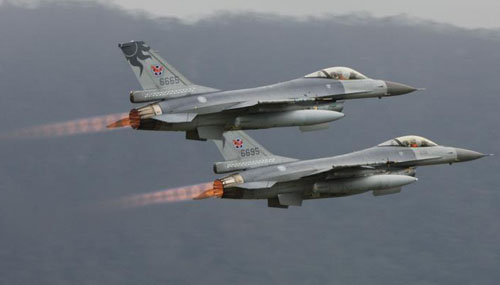by WorldTribune Staff, April 1, 2019
The Trump administration has hinted it may soon sell 60 F-16s to Taiwan in what observers say would be a “huge shock” to China.
Selling the F-16s to Taiwan, which has sought the jets for more than a decade, would add to several other moves the U.S. has made in support of Taiwan in recent months amid President Donald Trump’s deal-making on trade with Chinese supreme leader Xi Jinping.

Despite China’s objections, the U.S. on March 24 sent Navy and Coast Guard ships through the Taiwan Strait.
Last week, China protested the U.S.’s accommodation of Taiwanese President Tsai Ing-wen in her stopover in Hawaii.
China denounced the U.S. moves as “extremely dangerous.”
Related: President Trump lifts ban on major arms sales by U.S. to Taiwan, March 19, 2019
U.S. has bolstered ties to Taiwan amid calls in Washington for a “whole-of-government” effort to prevent China from surpassing American military and industrial dominance, analysts say.
China has invested heavily in military hardware over the past two decades, building a world-class navy and filling its coastline with missiles capable of hitting Taiwanese targets. The country spent 23 times more than Taiwan on defense in 2017, up from double in 1997.
For Beijing, the sale of the U.S. F-16s to Taiwan “would be a huge shock,” said Wu Shang-su, a research fellow at the S. Rajaratnam School of International Studies in Singapore. “But it would be more of a political shock than a military shock. It would be, ‘Oh, the U.S. doesn’t care how we feel.’ It would be more of a symbolic or emotional issue.”
China’s defense ministry warned against moves that undercut the contention that the mainland and Taiwan are part of “one China.”
“Any words or actions that undermine the one-China policy are tantamount to shaking the foundation of China-U.S. relations, are inconsistent with the fundamental interests of China and the United States and are also extremely dangerous,” Col. Wu Qian said at a briefing in Beijing on March 28.
Washington has no formal ties with Taiwan but is bound by law to help provide the democratic island with the means to defend itself and is its main source of arms.
The Pentagon says the United States has sold Taiwan more than $15 billion in weaponry since 2010. Presidents since Bill Clinton, however, have repeatedly rebuffed Taiwan’s requests for new fighter jets and other advanced weapons systems that could provoke Beijing. President Barack Obama agreed in 2011 to merely upgrade Taiwan’s aging F-16 fleet.
The U.S. Defense Intelligence Agency released a report earlier this year describing Taiwan as the “primary driver” for China’s military modernization.
Scott Harold, an associate director of Rand Corp.’s Center for Asia Pacific Policy, told Bloomberg in a March 30 report that “Taiwan will continue to need to invest in missiles, electronic warfare, mines and other advanced conventional and asymmetric capabilities designed to deter, and if necessary defeat, any Chinese effort to use coercion to compel unification.”
Rand analysts argued in a 2016 report that China’s sophisticated short-range ballistic missiles could “cut every runway at Taiwan’s half-dozen main fighter bases and destroy essentially all” parked aircraft in a conflict. Any planes that made it in the air could face Chinese pilots flying jets such as the J-20, a “fifth-generation” stealth fighter considered to be a rival to Lockheed’s advanced F-22s and F-35s.
The U.S. refused Taiwan’s request for F-35 fighter jets.
“It’s better for us to have F-16s as a first priority,” said Feng Shih-kuan, who served as defense minister under Tsai until February last year and is now at the Taipei-based Institute for National Defense and Security Research. “We won’t feel any sadness if we don’t get F-35s.”
Your Intel Brief: Geostrategy-Direct __________ Fix The Media Now
